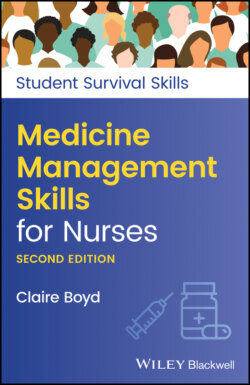Читать книгу Medicine Management Skills for Nurses - Claire Boyd - Страница 11
Оглавление
Introduction
Hello all, my name is Claire and I have been a nurse and Practice Development Trainer in a large Nation Health Service (NHS) trust for over 30 years (I started very young)! This is the second edition of this book which is jam‐packed with information – filled to the rafters with information in a book small enough to be carried around and referred to without weighing a ton and giving you a hernia!
Chatting to nursing staff, just like you, I have often been told that they have real fears about all aspects of medicines management. These fears are especially with regard to the administration of drugs, knowing that this is a skill they will have to acquire and use throughout their chosen career. Does this sound like you? Are you a little over‐awed with the prospect of being let loose in your clinical area to administer drugs to the patients?
To add to the fear factor, many students complain that they are often unable to practice their drug‐administration competences under supervision due to the ever‐increasing demands on the preceptor (wait until you become one and see how hard it is!). They tell me that they are not getting adequate input in the area of medicines management during their training, so their thinking is, ‘how am I meant to get my competences signed off, let alone become confident and competent?’
No need to fear: this book will at least give you the knowledge behind the skill, increasing your confidence and competence prior to really getting stuck in with the ‘hands‐on’ element in your clinical area. In short, this book is designed to support you, the Student Nurse as well as those who are newly qualified – the Newly Qualified Nurse (NQN) – congratulations on your wonderful achievement. Also, with the ever‐changing face of health care, it is also aimed at those of you who are now expected to administer medications, namely the Assistant Practitioners and to the newer members of our family the Nursing Associate and the Non‐Medical Nurse Prescriber (NMP). This book is also for those of you coming back into nursing – The Return to Practice Nurse and Overseas Nurses – welcome all!
This book contains the information and exercises I deliver to healthcare professionals during their medicines management training. I hope that I have made the writing style informal but brief, as though I am sitting beside you to help you along the way. All the answers to the activities, questions, and ‘Test your Knowledge’ exercises can be found at the back of the book.
Remembering my own time as a student nurse, it was being let loose with the drug trolley that most scared me: what if I made a mistake? Times have not changed, as many of you have informed me that you need a book to increase your theoretical knowledge, as well as to advise on the practicalities.
Throughout the book students have added their own words of wisdom, in the form of tips for their peers from their own experiences, or queries they may have had. I have also taken on board subjects you wanted added to this second edition:
Web resources added to chapters – tick
Oxygen therapy information added – tick
More case studies – tick
Drugs that may contribute to falls in frail adults – tick
More on cultural considerations in medicines management – tick
The book is designed to take you from your first day ‘on the job’ to your qualification, and beyond. It covers all areas of medicines management, for the acute hospital to the community, adults, and paediatrics.
Nursing is a dynamic field and the book is evidence‐based and looks at the theory and practice of drug administration briefly and coherently. The pharmaceutical industry is forever evolving and new drugs are coming onto the market regularly. Take time to talk to your patients to gain an understanding of drugs you may not have seen before. Pick up the new editions of the British National Formulary or go on‐line to access it (adult and paediatric editions) and dip into this source of information regularly.
Please remember that there are many areas within the clinical skill of drug administration that a student is not permitted to undertake. For instance, you may not give intravenous drugs. This does not mean that you can't observe these drugs being prepared and administered by professionals. Never perform any task that you are not permitted to undertake, even if you are asked to do so.
My final tip to you is never administer a drug to anyone without knowing what it does and why it has been prescribed and all the contra‐indications. Lastly, take your time when administering medicines and never cut corners.
